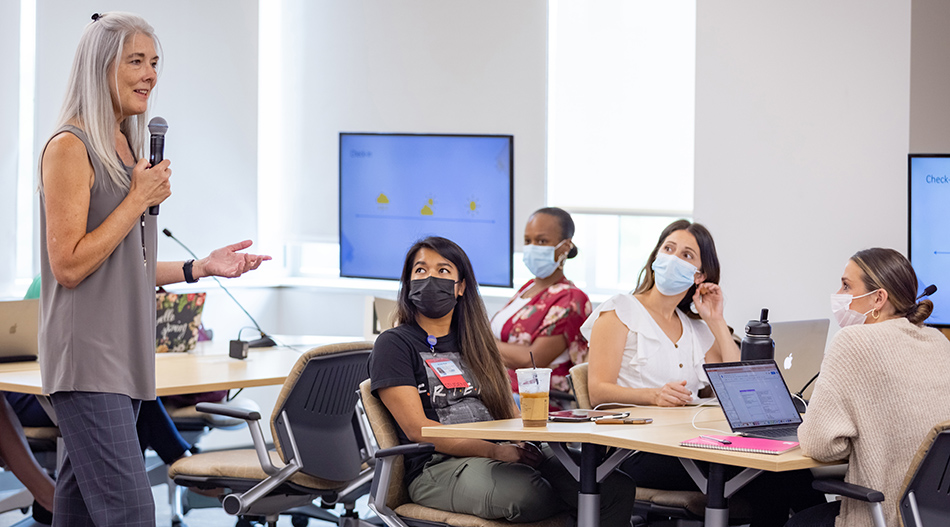Love of sciences leads to life of teaching
Entry-level nursing program director embraces academia, supporting students

Shana Ruggenberg, the director of the Master’s Entry Program in Nursing at the UC Davis School of Nursing, finds her joy in teaching tomorrow’s nurses.
Shana Ruggenberg did not set out to become a registered nurse. But she graduated college with a love of science and all the difficult science classes under her belt.
“I had a lot of friends going into nursing and I was intrigued with what they were doing, so I changed my degree and went into nursing,” said Ruggenberg, director for the Master’s Entry Program in Nursing (M.E.P.N.) at the Betty Irene Moore School of Nursing at UC Davis.
Not long into her career while working in small hospitals in Central California, Ruggenberg found her first love — taking care of women with obstetric or gynecological needs. She taught childbirth classes to pregnant women, which sparked her interest in teaching. So, she advanced her education with a master’s degree as a clinical nurse specialist.
“I really loved working with adult learners and the finetuning of a class,” she said. “Halfway through my career, I switched to academic nursing. I had the clinical knowledge, but I realized I needed to learn more about education.”
That spirit of lifelong learning led to her earning a Doctor of Education in Learning and Instruction from the University of San Francisco. She launched her academic career and, in 2019, joined UC Davis where she continues to learn from students.
“When a student is curious about something and maybe challenges me on something, it gives me the chance to go, ‘Hunh, I never really looked at it that way. Let’s figure it out,’” Ruggenberg explained. “I love that part of education. I love it when a student takes the initiative to learn more and digs in.”
Ruggenberg still recalls the first time she experienced simulation technology.
“When I saw my first simulation manikin I was blown away. I thought, what a fantastic thing this is to broaden how we learn and how we help students,” she said. “Over my career I’ve seen a number of those things happen that serve as an adjunct to how people learn.”
The pandemic presented a new challenge and new opportunities for instruction.
“All the PPE (personal protection equipment), the masks, the gowns, the face shields, can serve to isolate patients in this environment. We must remind students of the humanity in our work and encourage them to pause and reflect in a meaningful way, then show them how it’s done,” she said. “One of the things I love about UC Davis is our relationship-based care models that are brought into the curriculum and into the medical center during their preceptorships.”
In addition to all the changes in technology, instruction and protocols in an endemic world, Ruggenberg says today’s graduates enter into a world of greater expectations than she did 40 years ago.
“There is so much more expected of nurses and health care professionals now than in years past. By virtue of the annual trainings, updated requirements and all that goes with the information explosion,” she said. “It becomes harder to keep that connection with the patient and the family because of what I think of as noise.”
Ruggenberg adds that the School of Nursing’s focus on communication and interprofessional skills prepares graduates for this new reality and keeps her on her toes as well.
“Every career goes through ebbs and flows. So, you look for things that bring you joy. For me, I get really enthused when I learn a new thing and when I can embrace that part of my nature.”





